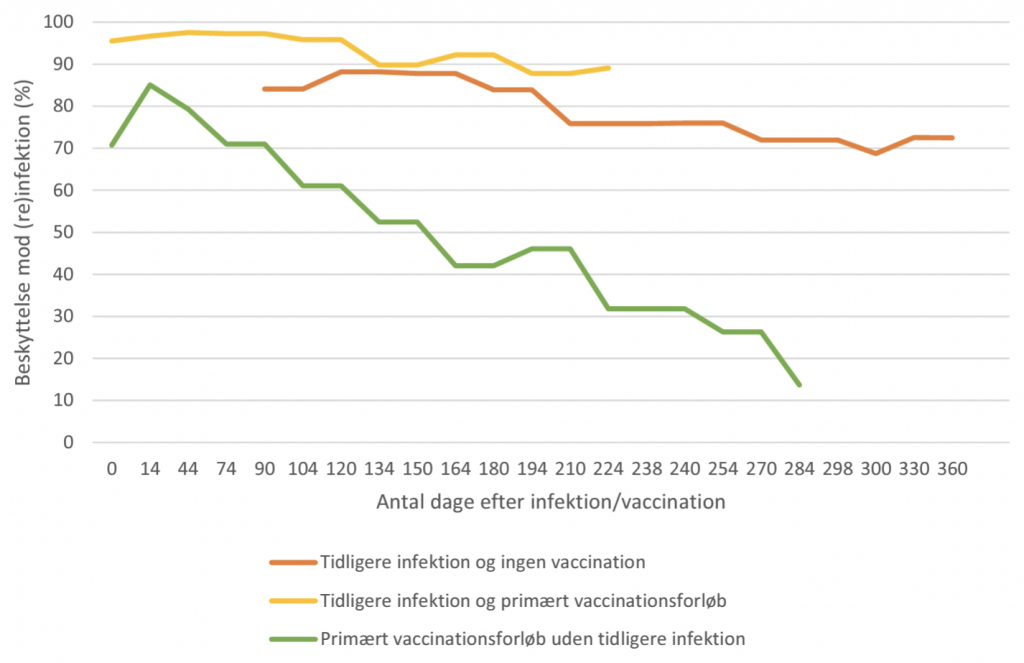Dr. Michael Mosley in the Daily Mail has written a piece criticising those like Novak Djokovic who say they regard themselves as in no need of vaccination as they have protection from a previous Covid infection. In the article Dr. Mosley – who is medically qualified but no longer a registered doctor and has worked as a BBC journalist for the past 37 years – makes a series of claims about the vaccines and natural immunity that don’t withstand scrutiny.
The first is that previous infection provides much less protection against Omicron infection than does vaccination.
Just because you have antibodies against a previous strain of Covid, that does not mean you are protected against catching, or spreading it to more vulnerable people such as patients with cancer or pregnant women. A study published in December, by researchers from Imperial College London, concluded that the protection against Omicron, if you have had a prior Covid infection “may be as low as 19%”. A course of vaccines – the double dose plus the booster – on the other hand, offers something like 75% protection.
What Dr. Mosley doesn’t mention is that the December study from Imperial was a preliminary study that also found no evidence of Omicron “having lower severity than Delta”. Omicron is now known to be considerably less severe than Delta, suggesting the study should not be taken as the final word on Omicron and natural immunity. A more recent study puts the protection provided by natural immunity against Omicron infection at 56%. This is higher than the level of protection reported for the boosters by the UKHSA, which finds just 40-50% protection at 10 weeks. The protection provided by previous infection is also more resilient.
Dr. Mosley’s explanation of why the protection from vaccines is supposedly superior to that from previous infection also makes no sense. He writes:
Why the difference? It appears that our immune systems are very good at learning from experience. The more often your immune system is challenged by a virus (or a vaccine, which is mimicking that virus), the better it gets at defending itself against it.
The first time your immune system encounters a virus it isn’t quite sure how to react and it takes time to start building an effective response. While that is happening, the virus is busy replicating, spreading and doing damage.
If you’re lucky, your immune system will spring into action and you will recover after a trivial illness. If you are unlucky, you end up in hospital, perhaps in intensive care. The idea of a vaccine is that your immune system gets the nudge to start working long before you are exposed to the real thing.
The reason for a second, and even third jab, is this amplifies and refines your immune response to protect you, and others, in the future.
This of course fails to explain why encountering the virus should provide less effective immune protection than a vaccine. Just because while your body is working out how to counter the virus the virus can make you unwell tells you nothing about how strong your subsequent immunity to re-infection will be. It is true that a vaccine mimics a virus to prime your immune system, and the idea of multiple shots is to improve that response. However, there is plenty of evidence that the vaccines are weaker and less resilient against infection than natural immunity. For example, see the chart below from a large Danish study, where the orange line for the previously infected (but not vaccinated) is higher and stays much higher than the green line for the vaccinated (but not previously infected).

It’s been suggested that the reason vaccine protection against infection (contra Dr. Mosley) is relatively weak and declines fast is because the vaccines, being based only on part of the virus and injected into muscle, do not produce the full immune response that encountering the full virus does. For example, encountering the virus produces mucosal (IgA) antibodies in the respiratory tract that are important in mounting an early response to infection; however, these are absent following vaccination.
Dr. Mosley then implies that vaccination is superior for protecting against new variants like Omicron and therefore better for preventing transmission and protecting the vulnerable.
Multiple exposures seems to be particularly effective at educating your T-cells, immune cells responsible for seeking out and killing dangerous viruses, and which are vital for conferring long-term immunity. T-cells also seem to be much better than antibodies at detecting and destroying new variants of Covid.
And this matters because one of the main reasons for getting vaccinated, as far as I’m concerned, is that by doing so you’re protecting others — particularly the vulnerable who cannot have a jab.
We know that people who are vaccinated carry a lower load of virus, and clear it faster from their bodies, so there is a much lower chance they will pass it on. Vaccines, of course, can have side-effects and are not 100% effective. One of the criticisms of Covid vaccines is that, despite being triple jabbed, you can still get infected and become ill.
As noted above, though, the evidence is that natural immunity is superior to vaccine immunity for protecting against infection, particularly over time and against new variants, so this argument fails. It’s also noteworthy that UKHSA data shows the vaccinated having significantly higher infection rates than the unvaccinated since the autumn, as does Public Health Scotland data, implying it is not true that the vaccinated spread the virus less than the unvaccinated.
The claim that people who are vaccinated carry a “lower load of virus” is also not supported by evidence. For instance, a study in the Lancet found no difference in household secondary attack rate depending on whether the index case was vaccinated, and correspondingly no difference in viral load. A study by the U.S. CDC also found no difference in infectiousness and concluded: “Clinicians and public health practitioners should consider vaccinated persons who become infected with SARS-CoV-2 to be no less infectious than unvaccinated persons.” UKHSA and others have also found viral load no lower in the vaccinated. These studies are all pre-Omicron, which is likely to be even more able to evade vaccines.
Dr. Mosley points out that protection from vaccination plus previous infection is superior to that from previous infection alone. This appears correct; however, as can be seen in the chart above, the difference is relatively small and almost all the protection comes from the previous infection rather than the vaccine. The difference will also likely diminish over time without frequent boosters.
Dr. Mosley disputes that antibodies from previous infection should be used as an indicator of protection.
Some people who are against mandatory vaccinations for NHS staff suggest we could test people for antibodies to COVID-19, and if they have them that would mean they are safe to work. But just because you have antibodies doesn’t mean you can’t infect others or get infected. That’s why regulators, such as the U.S. Food and Drug Administration, have recommended that antibody tests should not currently be used to evaluate a person’s level of immunity or protection from a Covid infection.
However, this argument applies with at least as much force to vaccination, as it’s evident that the vaccinated can and do frequently contract and transmit the virus, seemingly more than the previously infected. So on that argument, why should vaccination status not equally be deemed inadmissible as evidence of being ‘safe’?
Dr. Mosley’s article is a classic example of only presenting the findings and data that back up one’s point of view, rather than looking at all the evidence in the round. Perhaps the Mail will now allow a better informed (and even registered and practising) medic to write a more accurate piece so as to avoid its readers remaining misinformed?












To join in with the discussion please make a donation to The Daily Sceptic.
Profanity and abuse will be removed and may lead to a permanent ban.